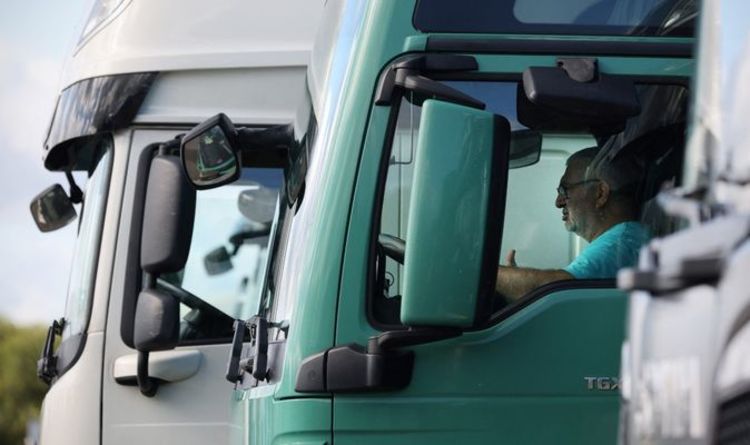Lorry driver shortage will benefit UK in long term says Ros Atkins
We use your sign-up to provide content in ways you’ve consented to and to improve our understanding of you. This may include adverts from us and 3rd parties based on our understanding. You can unsubscribe at any time. More info
HGV drivers have provided a damning insight into the working conditions and lack of economic prosperity in Spain. The haulage industry in Spain, like much of Europe and the UK, has been hit in the wake of the coronavirus pandemic.
The shortage in the UK labour market has exacerbated already strained global supply chains and has resulted in some empty shelves and queues at the petrol pumps.
José Ramón Gimeno, a 44-year-old self-employed lorry driver from Spain, explained the strain the job has put on his family life balance – and warned the problems faced in Britain could be repeated in Spain.
He said: “You have no family life, nobody can count on you for anything, I don’t even know what time I’m going to get back home, or if I’m going to get back.
“My wife can’t count on me to pick up the children, or to go to a school meeting, she has to do everything.”


Mr Gimeno said the haulage industry started to go into decline following the 2008 financial crash and has never fully recovered.
He added: “Prices have been frozen since the crisis broke out, there was a drop in everything and, since then, the business has become increasingly difficult to run, profitability is decreasing.
“In a short time we will be like in the UK.”
In Spain around one-in-three HGV drivers are self-employed and soaring petrol prices have severely reduced profit margins for many workers.

Víctor González, co-owner of a transport company with three lorries and president of Fetransa, a federation of small companies and self-employed workers, has warned companies are now struggling to make money.
He said: “We are in a very delicate situation because this jungle that road transport has become, in which companies are very unprofitable, has generated a situation of precariousness in the sector.”
Javier San Martín, professor of logistics at the OBS Business School in Barcelona, predicted things will get worse over the next decade due to the advancement of artificial intelligence.
Mr Martin said: “In a few years’ time, we are going to have a technological innovation that is going to make many drivers lose their jobs, autonomous lorries.
“It is not yet clear when their use will be legislated in the EU, but everything seems to indicate between 2026 and 2030.”
DON’T MISS
Brussels is told to keep the European court out of NI Brexit deal [INSIGHT}
Royal Family LIVE: William’s space probe claim sparks fury [LIVE]
UK snow maps show EXACT date snow will blanket Britain – latest charts [FORECAST]

The UK Government has attempted to alleviate the shortage of lorry drivers by offering short-term visas to EU workers.
Spanish trucker, Gabriel Falcón, 51, revealed he turned down the opportunity due to the amount of checks involved and insisted the pay on offer was not worth the relocation.
He said: “I called out of curiosity because I saw an offer on Facebook to work in the UK
“They paid £3,800, but they required a good level of English, they gave you a three-month visa and then everything there is very expensive.
“In the end, you do the maths and, to earn a little more, it’s just not worth it for me. Maybe it is for more adventurous people, but not for me.”

The UK Government said it would issue 5,000 temporary visas to HGV drivers and a further 5,500 to poultry workers in an attempt to prevent shortages in the run up to Christmas.
But, Conservative Party chairman Oliver Dowden said the numbers of drivers applying were “relatively limited”, with about 300 applications received and about 20 actually issued.
His comments came as Home Office Minister Kevin Foster told MPs each application would take 15 working days to process.
Mr Dowden told LBC: “The number so far is relatively limited.
“We have 300 people that have applied for these visas. I believe the number is just over 20 that actually received them, so are on the road, but I expect that number to increase over time.”
Additional reporting by Maria Ortega.
Source: Read Full Article
